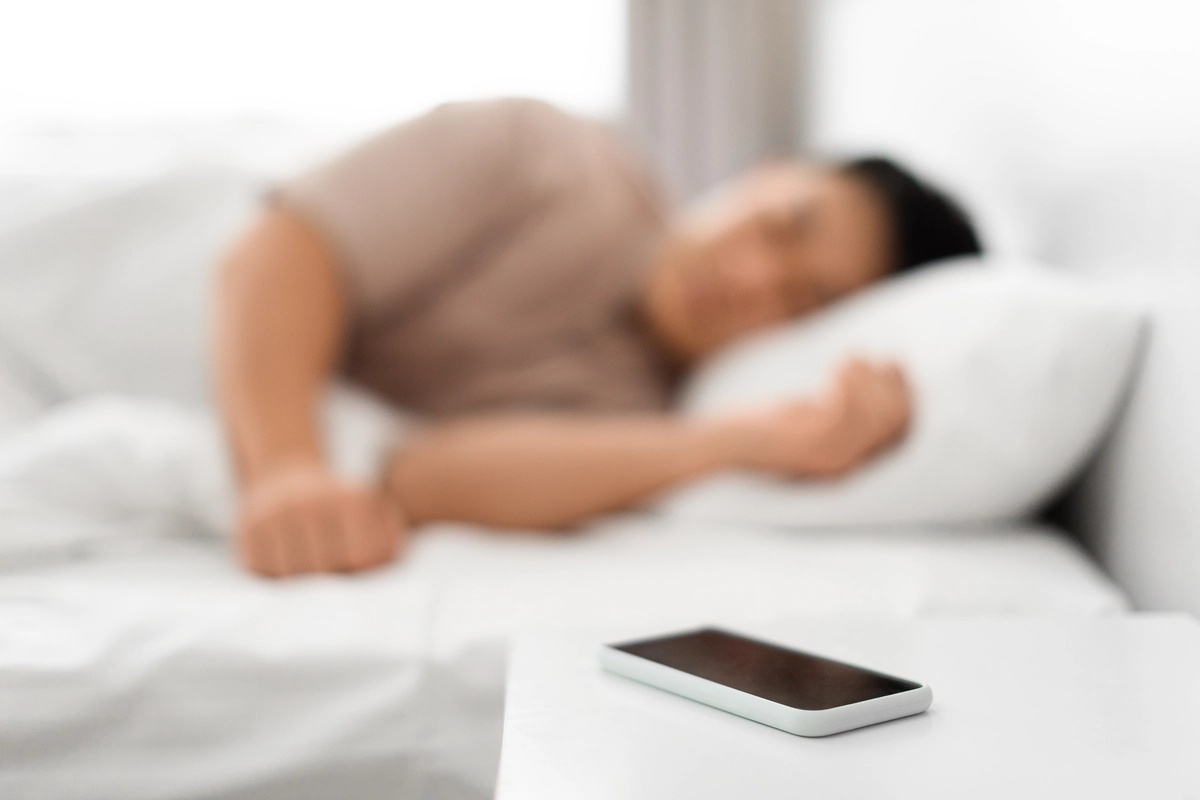Phone Addiction: Symptoms, Warning Signs, & Treatment Options


Our phones are incredible tools for connection, but with the wide capabilities of modern smartphones, it can be easy to get caught up in social media feeds and other sources of constant entertainment. Before you know it, your head is hung over your phone for hours on end, leading to both psychological and physical consequences. Thankfully, treatment is available. Learn about the symptoms, causes, and treatment options for phone addiction here, and call The Forge Recovery Center if you’re ready to look up from the screen and reconnect with the world around you.
What Is Phone Addiction?
Phone addiction refers to a compulsive behavior where individuals excessively use their smartphones, leading to negative consequences in various aspects of their lives. Symptoms of phone addiction include constantly checking for notifications, feeling anxious when without a phone, neglecting real-life interactions, and spending excessive amounts of time on the device. This addiction can impact one's mental health, relationships, productivity, and overall well-being.
Treatment often involves setting boundaries, reducing screen time, and seeking professional help if necessary. It is essential to recognize and address phone addiction to maintain a healthy balance between technology use and other aspects of life.
Phone Addiction Symptoms
Phone addiction can drive certain behavioral changes, such as neglect for other responsibilities, as well as emotional symptoms including feelings of loneliness and isolation. Let’s explore these symptoms further:
Behavioral Changes
When dealing with phone addiction, you might notice various behavioral changes in yourself and others. You may find it challenging to control the amount of time spent on your phone, leading to neglect of responsibilities. The constant urge to check your phone can disrupt daily activities, affecting productivity.
Moreover, the compulsive use of your smartphone can manifest in you feeling anxious or restless when away from your device. This behavior can escalate to the point where you prioritize phone interactions over face-to-face conversations. Such actions can strain relationships with friends, family, and colleagues.
Emotional Toll
The emotional toll of smartphone addiction is profound and can impact your mental well-being significantly. Phone overuse can lead to feelings of loneliness, isolation, and even depression. Constant exposure to social media and internet content may distort reality, leading to negative self-perception.
As a result, you might experience increased stress levels and difficulty managing emotions effectively. This emotional distress can further exacerbate the cycle of phone addiction, creating a harmful loop. To cope with these emotional consequences, consider implementing strategies such as setting boundaries for phone usage, engaging in offline activities, and seeking professional help if needed.

Are You Struggling with Mental Health or Addiction?
We Can Help. Call Us Now!
CALL: 877-839-1772
Treatment Options for Phone Addiction
Phone addiction is typically treated with professional counseling, support groups, and self-help digital detox strategies to limit phone overuse. Treatment centers can also help if symptoms are severe and cause major disruptions in daily life. Here’s a summary of the typical treatment avenues for smartphone addiction:
Professional Counseling
When dealing with phone addiction, seeking professional counseling can be highly beneficial. By engaging in therapy sessions, you can gain valuable insights into your addiction patterns and learn effective coping mechanisms. Therapists specializing in addiction can provide tailored strategies to help you overcome your dependency on your phone.
Consider the advantages of counseling - it offers a safe space to discuss your struggles openly, receive personalized guidance, and develop healthier habits. Through therapy, you can address underlying issues contributing to your excessive phone use and work towards sustainable behavior change.
Therapy options for phone addiction recovery may include cognitive behavioral therapy (CBT), which focuses on modifying negative thought patterns and behaviors related to phone usage. Mindfulness-based therapies can help you cultivate awareness of your phone habits and promote present-moment engagement.
Support Groups
Joining support groups dedicated to addressing smartphone addiction allows you to connect with others facing similar challenges. By sharing experiences and insights with peers, you can feel understood and supported in your journey towards reducing phone dependence. These groups create a sense of community where you can find comfort, encouragement, and motivation to make positive changes.
In a support group setting, you have the opportunity to learn from others' strategies for managing phone usage effectively. The shared camaraderie fosters accountability and mutual encouragement, strengthening your resolve to limit screen time and prioritize real-life interactions.
Digital Detox Strategies
To combat phone addiction, incorporating digital detox strategies into your daily routine is crucial. Begin by setting boundaries around phone usage, such as designating specific times for checking messages or social media. Gradually reduce screen time by replacing digital activities with offline pursuits like reading, exercising, or spending time outdoors.
Embrace the concept of digital detox, which involves taking intentional breaks from electronic devices to restore mental clarity and focus. Engage in activities that promote relaxation and mindfulness, such as meditation or yoga, to counterbalance the constant stimulation from screens.
Create a personalized plan for a successful digital detox by identifying triggers that prompt excessive phone use and implementing alternative behaviors. Utilize smartphone features like app timers or Do Not Disturb mode to limit distractions and establish healthy boundaries with technology.
Treatment Centers
Outpatient treatment centers can also play a crucial role in helping individuals overcome phone addiction. These centers offer therapy sessions, support groups, and counseling to address the underlying issues that contribute to excessive phone use. Through personalized treatment plans, patients can learn healthier coping mechanisms, set boundaries with their technology, and develop strategies to reduce screen time.
With professional guidance and support, individuals can make positive changes and establish a healthier relationship with their devices.
Phone Addiction Warning Signs
There are a set of warning signs to watch out for in both yourself and loved ones when it comes to smartphone addiction, from overuse and social withdrawal to ongoing sleep disturbances. Here’s an overview of the red flags to be aware of:
Excessive Use
When smartphone users spend excessive time on their devices, it can lead to various dangers. You may notice increased eye strain and posture problems from prolonged phone use. To prevent this, set daily limits on your phone usage to maintain a healthy balance.
Excessive phone use not only affects your physical health but also impacts your mental health. It can heighten stress levels and reduce productivity in daily tasks. By setting boundaries, you can avoid the negative consequences of phone addiction on your overall well-being.
Social Withdrawal
If you find yourself constantly engrossed in your phone, you might be experiencing social withdrawal. Smartphone addiction often leads to feelings of isolation and disconnection from real-life social interactions. To overcome this, try engaging in face-to-face conversations and social activities to rebuild meaningful connections with people.
Sleep Disturbances
The blue light emitted by smartphones can disrupt your sleep patterns, leading to insomnia and poor sleep quality. To combat these effects, practice good sleep hygiene habits such as establishing a bedtime routine, limiting screen time before bed, and creating a restful sleep environment.
Prioritizing quality sleep over late-night scrolling is essential for combating the negative impact of phone addiction on your rest. By implementing these strategies, you can improve your sleep patterns and wake up feeling more refreshed and energized each day.
Neglected Responsibilities
Neglecting responsibilities due to excessive phone use can hinder personal growth and development. If you find yourself procrastinating important tasks in favor of endless scrolling, it's time to reassess your priorities. Create a daily schedule that allocates specific time slots for both phone usage and completing tasks efficiently.
Balancing phone use with daily responsibilities is key to preventing the negative consequences of neglecting important duties. Reflect on how excessive device dependency may be hindering your progress and take proactive steps to prioritize responsibilities for personal growth.
Are You Struggling with Mental Health or Addiction?
We Can Help. Call Us Now!
CALL: 877-839-1772
Causes of Phone Addiction
Anyone can become addicted to their phone, as it’s not determined by genetic or environmental factors the way substance use disorders or other types of addiction are. Instead, this type of addiction arises out of social influences and your own unique, personal triggers:
Societal Influences
Your phone addiction can be influenced by societal factors. The constant need for social validation through likes and comments on social media platforms like Instagram and Facebook can drive excessive phone use. Additionally, the fear of missing out (FOMO) on important updates or events can also contribute to your addiction.
Personal Triggers
Your personal experiences and emotions play a significant role in fueling phone addiction. For example, feelings of loneliness or anxiety might push you to seek comfort in the virtual world offered by your phone. Moreover, using your phone as a coping mechanism to escape stress or boredom can lead to an unhealthy dependency.

Consequences of Phone Addiction
Phone addiction can have both psychological and physical effects, from GABA dysfunction and grey matter reduction to the neck strain associated with “tech neck.” Here’s an overview of the adverse mental and physical effects that often result from phone addiction:
Psychological Effects
GABA Dysfunction
When GABA (gamma-aminobutyric acid) is disrupted due to phone addiction, it impacts brain chemistry significantly. This disruption can lead to increased anxiety and difficulty in controlling impulses. The role of GABA is crucial in regulating stress and anxiety levels.
Grey Matter Reduction
Phone addiction has been linked to grey matter reduction, particularly in areas responsible for decision-making and self-control. This reduction can result in poor impulse control and weakened cognitive functions. Preventive measures include limiting screen time and engaging in activities that stimulate brain function.
Suicide Risk for Severe Cases
In severe cases of phone addiction, there is a heightened risk of suicidal thoughts and behaviors. The correlation between phone addiction and mental health issues like depression is concerning. Interventions such as therapy, support groups, and reducing screen time can help mitigate this risk.
Physical Effects
Eye Strain
Excessive screen time from phone use can cause eye strain, leading to symptoms like headaches, dry eyes, and blurred vision. Implementing practices such as the 20-20-20 rule (looking at something 20 feet away every 20 minutes) can help alleviate eye strain. Untreated eye strain may result in long-term vision problems.
Neck Pain
Poor posture while using phones often results in neck pain due to prolonged strain on neck muscles. Ergonomic solutions like using a phone stand or holding the device at eye level can reduce neck pain significantly. Maintaining proper posture by keeping your back straight when using your phone is essential for preventing discomfort.
Are You Struggling with Mental Health or Addiction?
We Can Help. Call Us Now!
CALL: 877-839-1772
How to Stop Phone Addiction Before It Starts
Certain strategies like setting screen time limits, establishing tech-free zones, and being mindful of your phone usage can help to prevent phone addiction from taking shape. Here’s a rundown of techniques you can use to keep your mobile consumption from reaching an addictive degree:
Screen Time Limits
When it comes to managing phone addiction, set screen time limits to prevent excessive usage. By regulating your screen time, you can control your phone usage effectively and reduce the risk of addiction. Implementing tools like built-in app timers or third-party apps can help enforce these limits.
To promote a healthy balance, discuss the benefits of regulating screen time, such as improved sleep quality and reduced eye strain. By limiting your screen time, you can also enhance your overall well-being by engaging in other activities that promote physical and mental health. Prioritizing offline activities over excessive screen time is crucial for maintaining a healthy lifestyle.
Implementing tools and techniques to enforce screen time limits is essential in combating phone addiction. Utilize features like app usage trackers and notifications to remind you when you've reached your limit. By being mindful of your screen time, you can take proactive steps to prevent phone addiction before it becomes a significant issue.
Tech-Free Zones
Create designated tech-free zones in your home or workplace to encourage offline activities and social interactions. Establishing boundaries for phone use in specific areas like the dining table or bedroom can help reduce distractions and promote meaningful connections with others. By designating certain spaces as tech-free zones, you can create opportunities for relaxation and face-to-face communication.
Discuss the advantages of having tech-free zones for mental health, such as reducing stress and enhancing focus. By disconnecting from technology in designated areas, you can improve your overall well-being and foster healthier relationships with those around you. Creating boundaries between technology use and personal space is essential in preventing phone addiction from taking hold.
Mindful Usage Practices
Practice mindfulness to develop a healthy relationship with technology and prevent phone addiction. Incorporate mindful usage practices into your daily routines by setting intentions before using your phone and being fully present in the moment. By cultivating mindfulness while using your phone, you can become more aware of your habits and make conscious choices about when and how often you engage with technology.
Explore the benefits of being present and mindful while using phones, such as reduced stress levels and increased focus on important tasks. By incorporating mindfulness into your daily interactions with technology, you can create a more balanced approach to phone usage that prioritizes mental well-being over constant connectivity. Embracing mindful usage practices is key to stopping phone addiction before it starts.

Phone Addiction Statistics
Phone addiction has become a growing concern globally, with statistics showing that approximately 5.4 billion people worldwide own a mobile device. In the United States alone, research has revealed that the average American spends over three hours a day on their smartphone. This constant connectivity and reliance on technology have led to an increase in phone addiction, impacting mental health and overall well-being. It is essential for individuals to be mindful of their phone usage and take steps to disconnect and prioritize real-world interactions for a healthier balance.
Are You Struggling with Mental Health or Addiction?
We Can Help. Call Us Now!
CALL: 877-839-1772
Closing Thoughts
You now understand the ins and outs of phone addiction: its symptoms, causes, consequences, warning signs, and treatment options. It's crucial to recognize the impact excessive phone use can have on your mental health and relationships. By taking proactive steps to limit screen time, seek support if needed, and prioritize real-world connections, you can combat phone addiction effectively.
Remember, your well-being comes first. Make small changes today to reclaim control over your phone usage and live a more balanced life. Disconnect to reconnect with what truly matters. Your mental health and relationships will thank you for it.
Treatment for Phone Addiction in Orange County
We recognize the difficulties of phone addiction, and how quickly it can go from excessive scrolling to a major disruption in your daily life. The sheer amount of hours spent, isolating effects, and pain it deals to your eyes and neck can be a struggle — and we’re here to lend a helping hand.
At The Forge Recovery Center, we offer a team of mental health experts and a range of proven treatment methods to guide you toward recovery, every step of the way. If you or a loved one are struggling at the hands of phone addiction, contact The Forge Recovery Center today to get the help you need and deserve.



